Charles E W Bean, Diaries, AWM38 3DRL 606/258/1 - 1914 - 1927 - Part 5
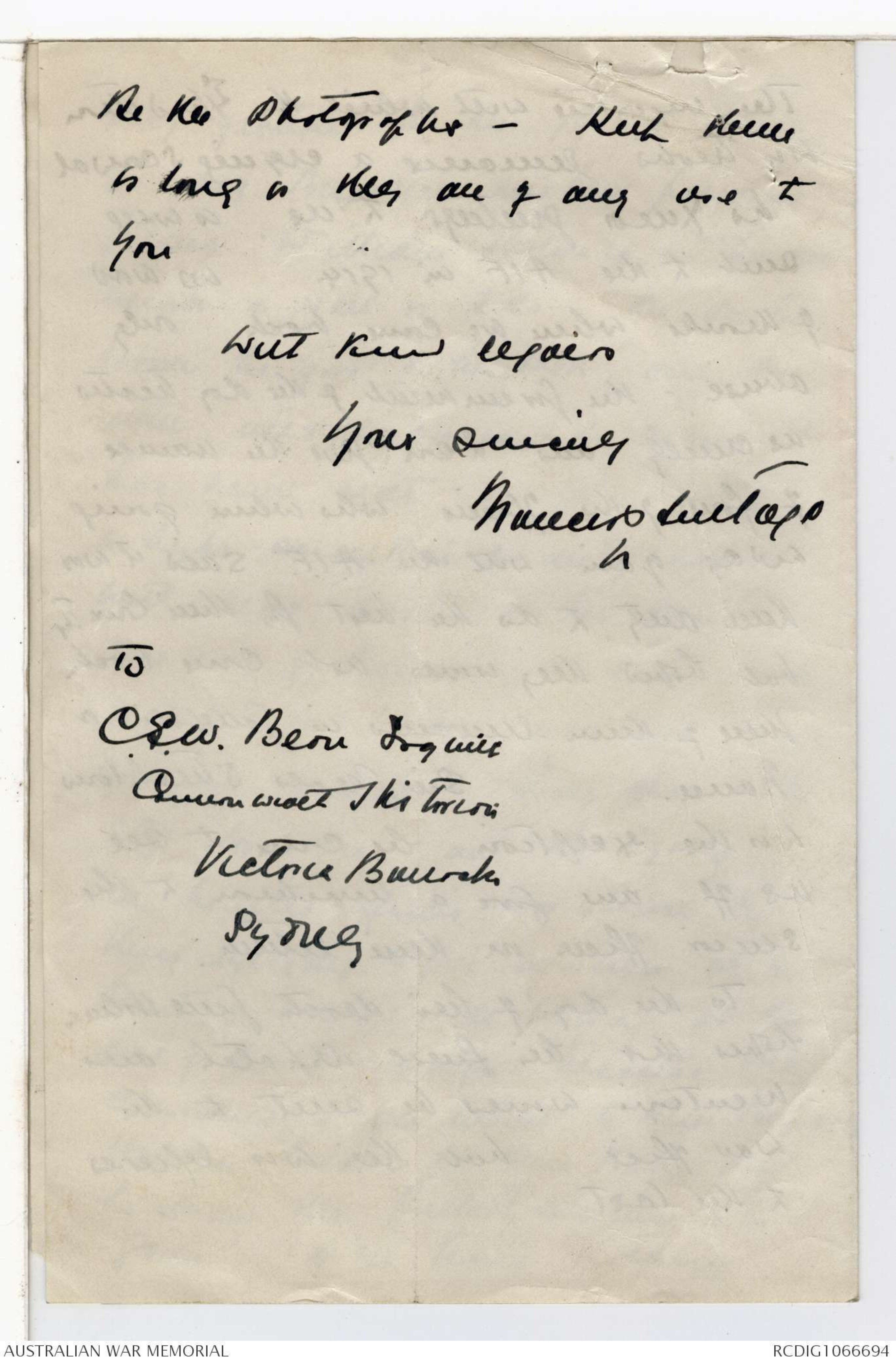
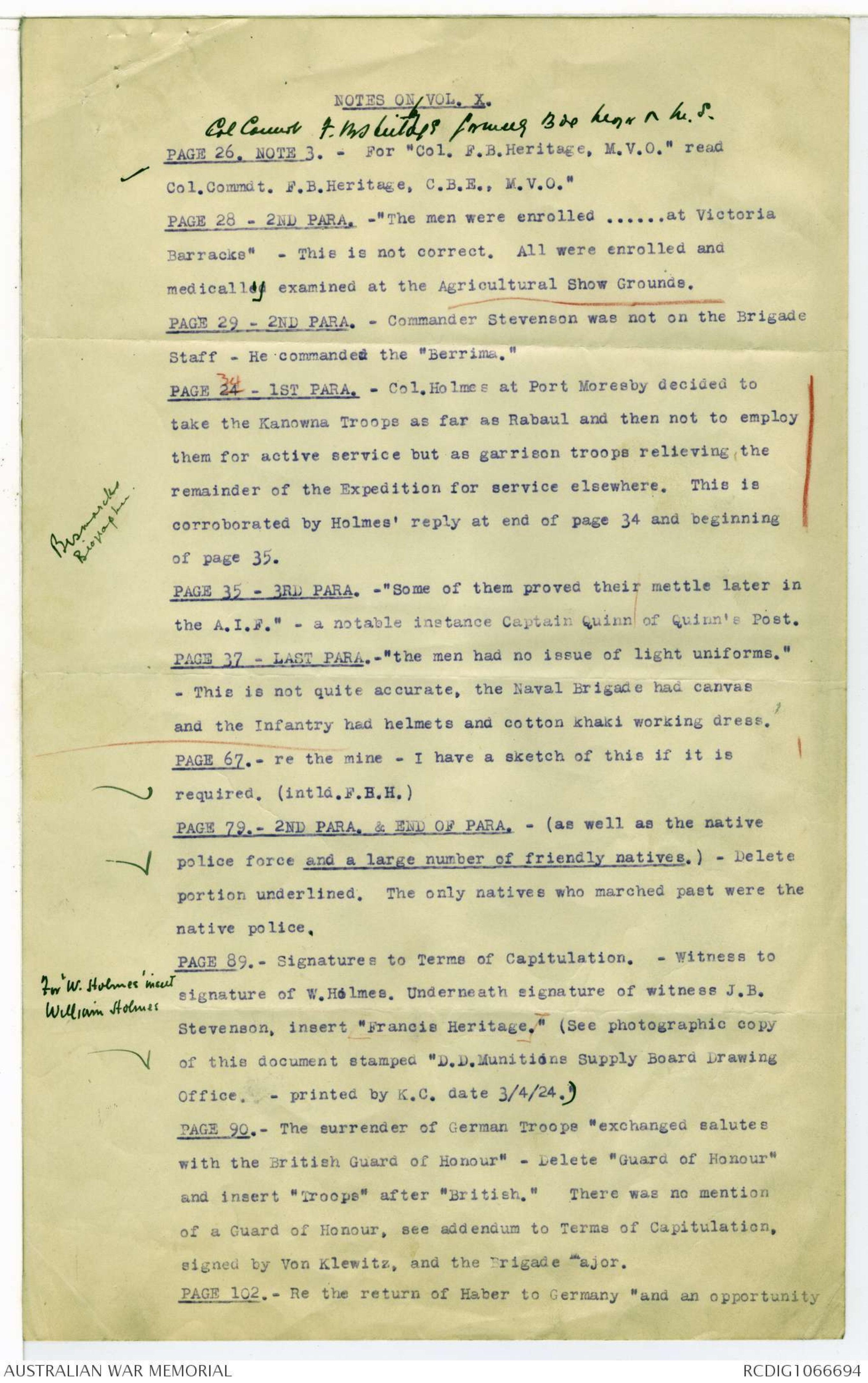
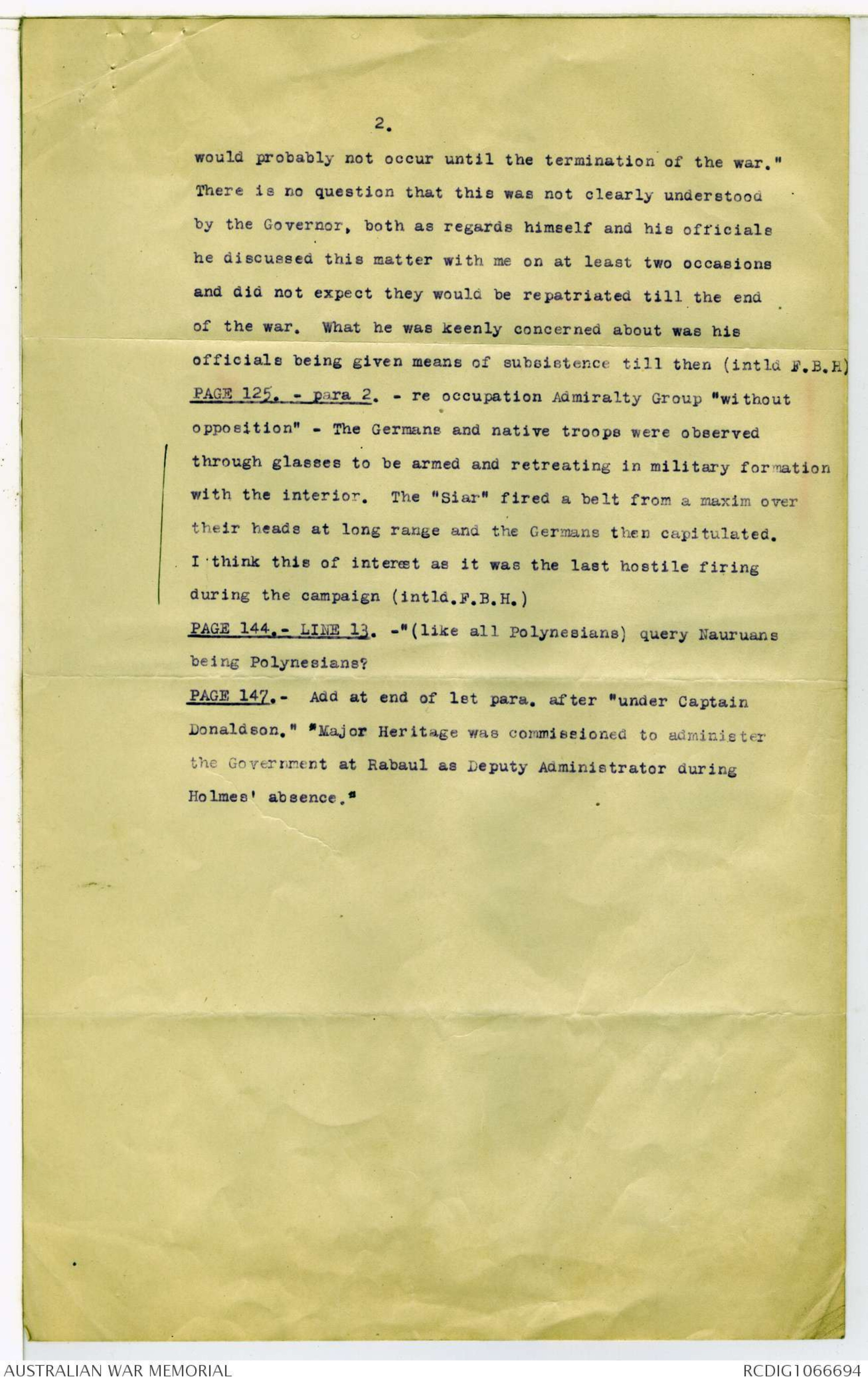
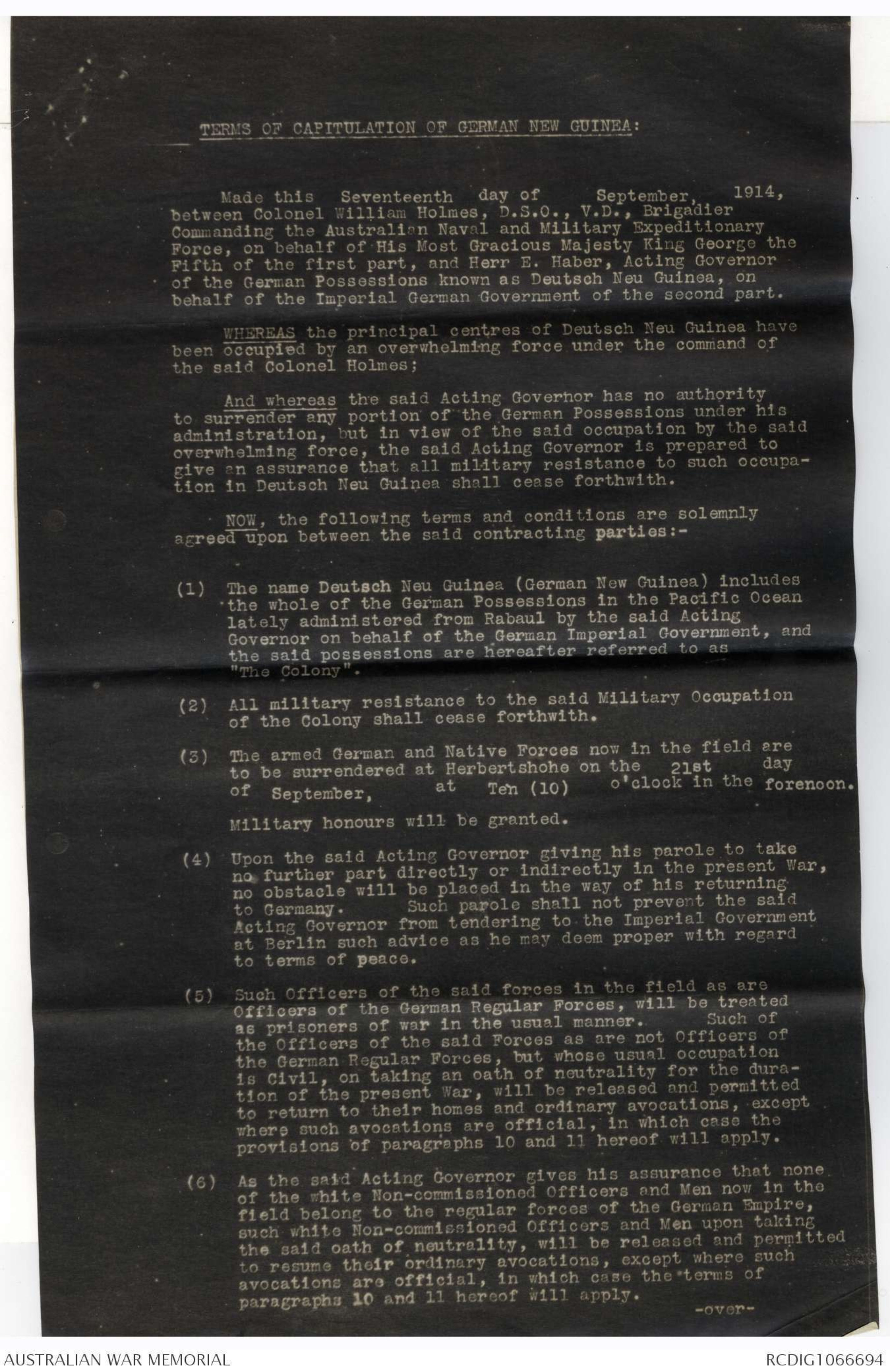
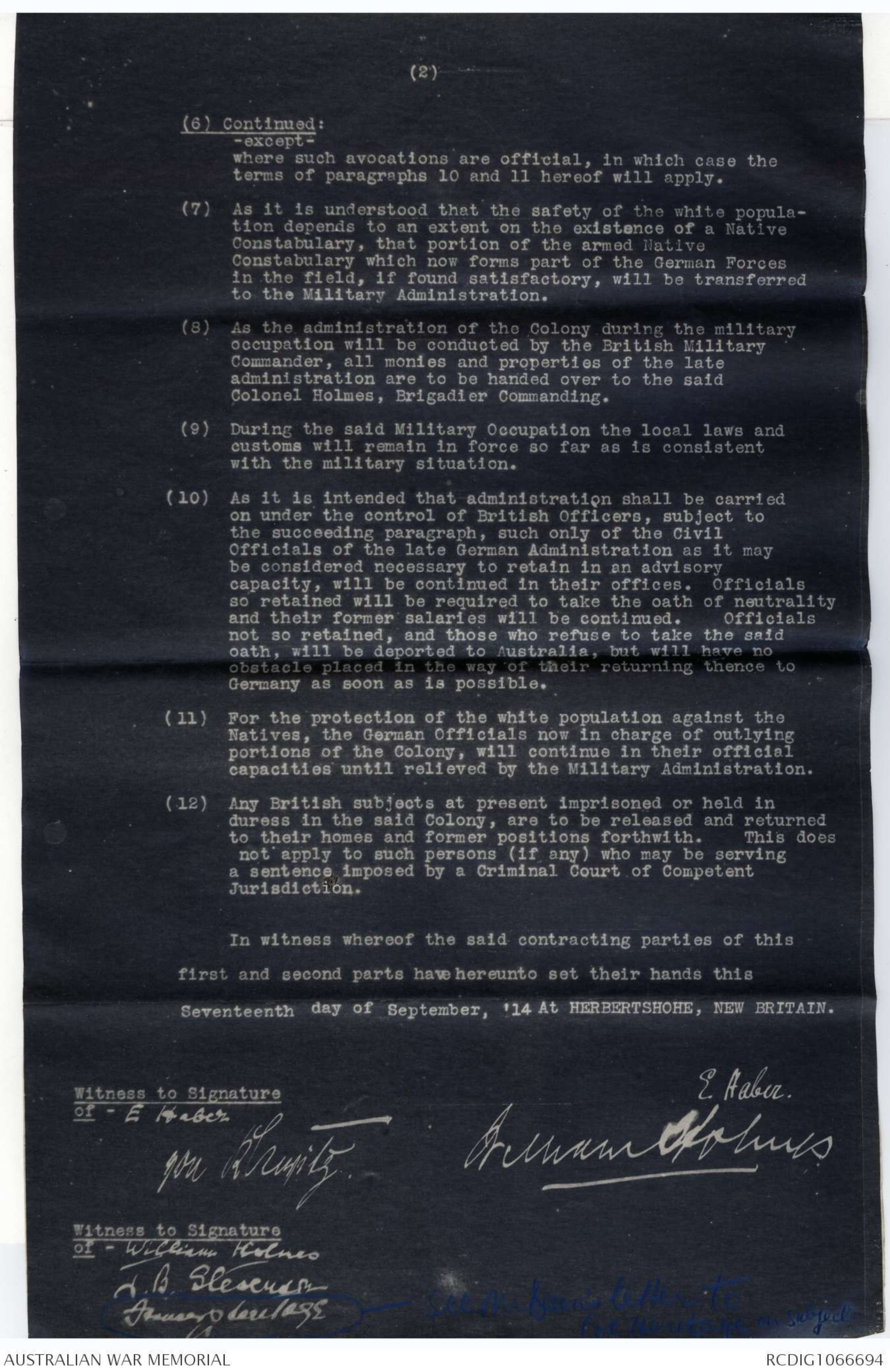
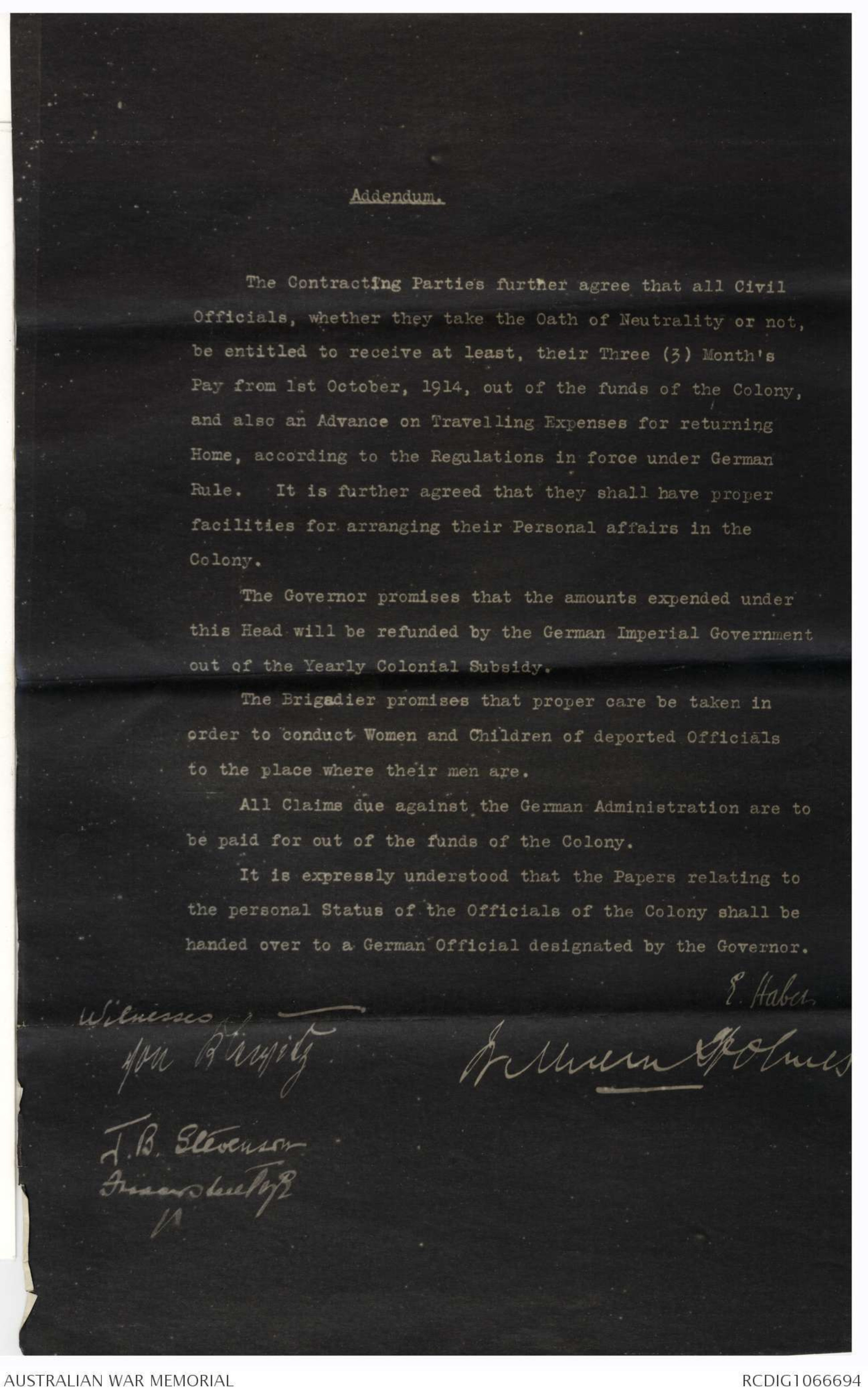
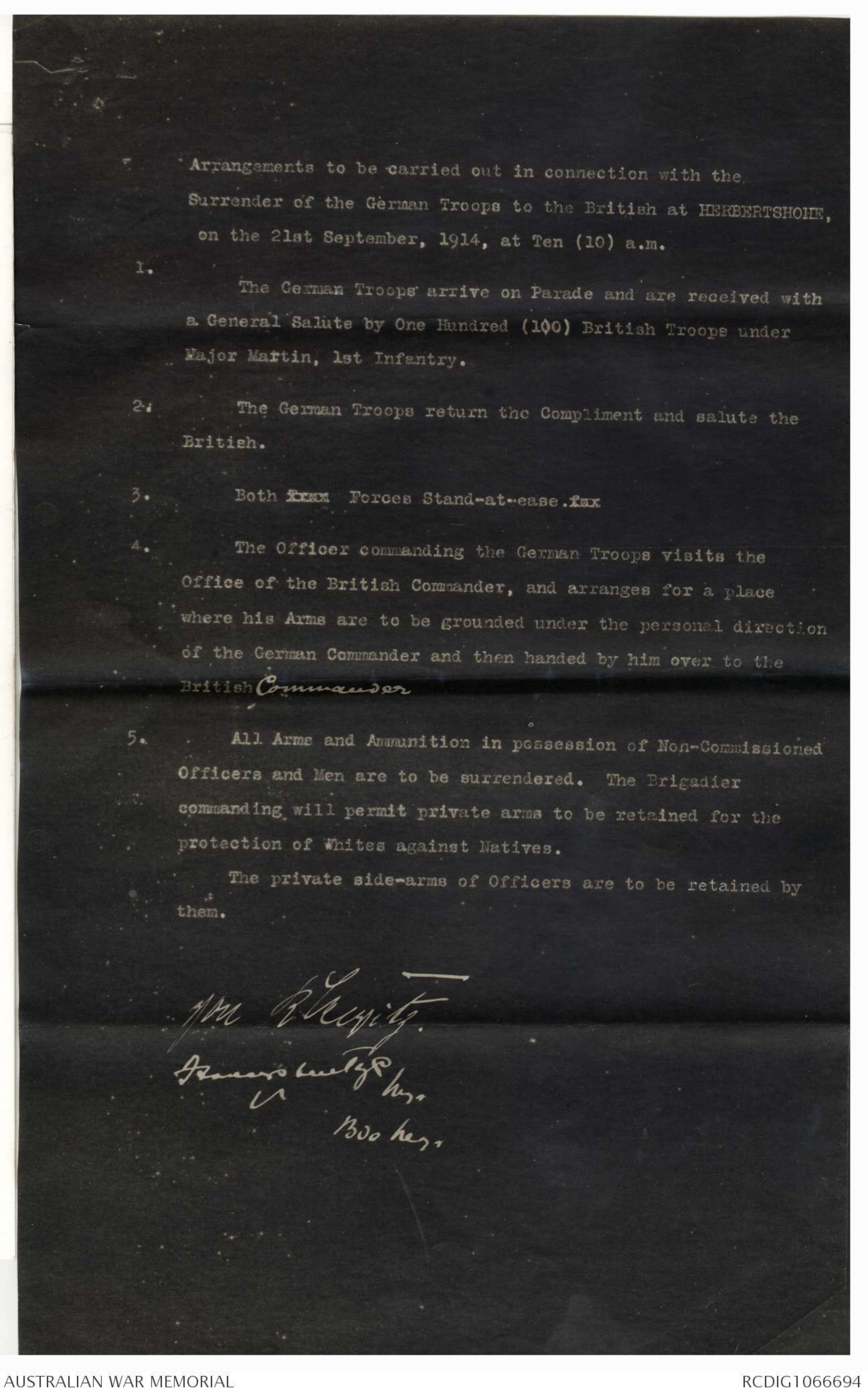
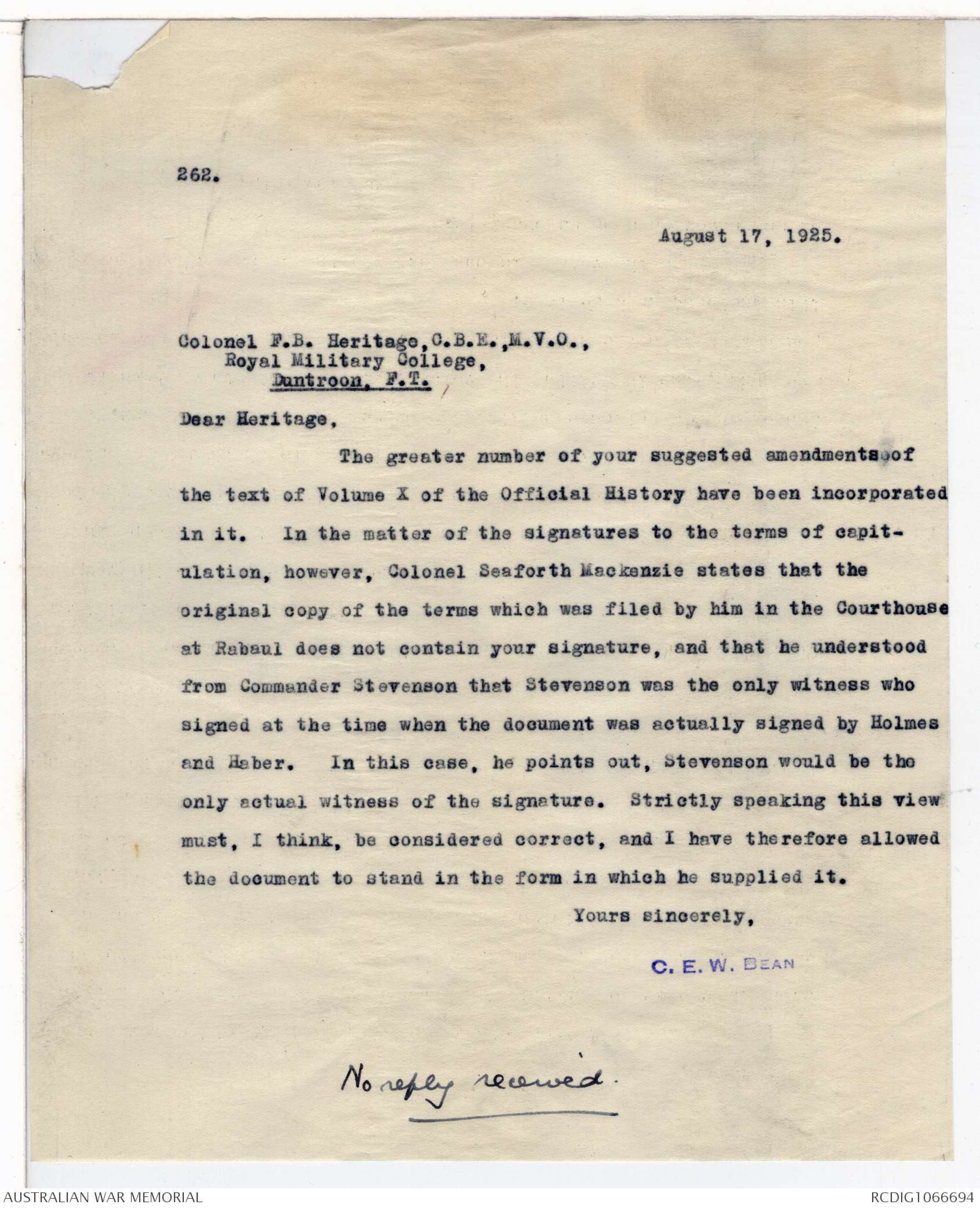
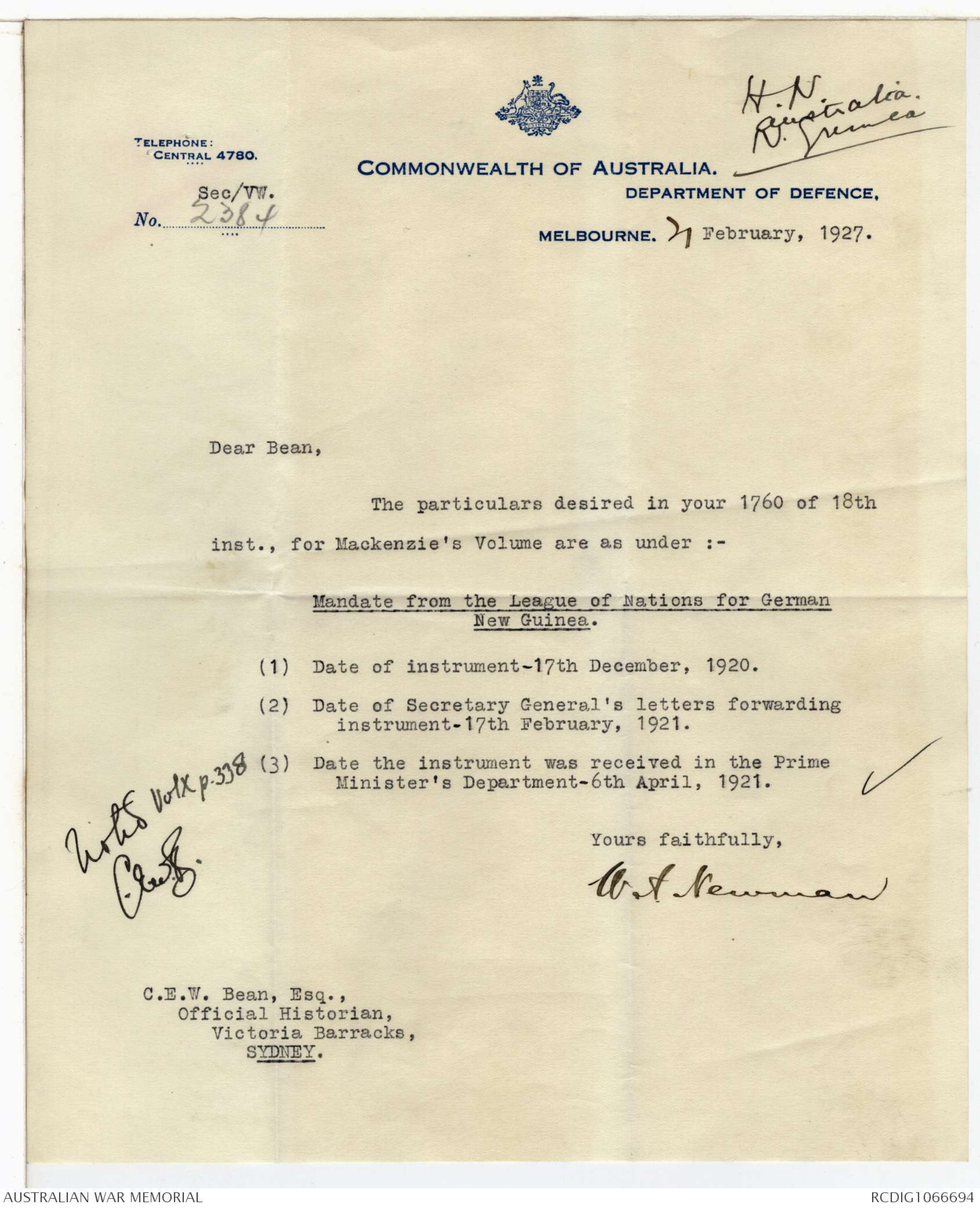
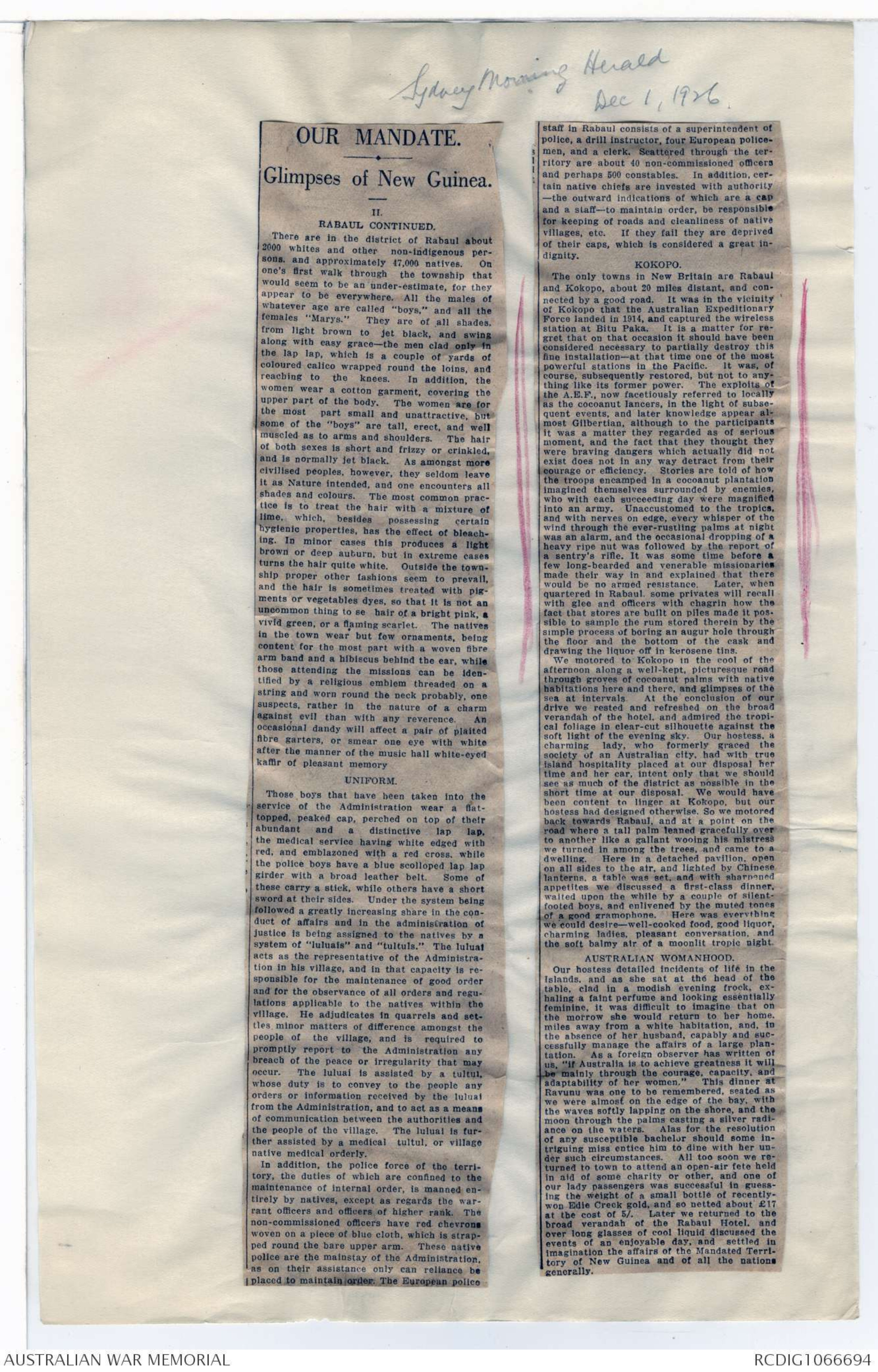
Re the Photographs - Keep these
as long as they are of any use to
you
With kind regards
Yours sincerely
[[M?]]
To
C.E.W. Bean Esquire
Commonwealth Historian
Victoria Barracks
SYDNEY
NOTES ON VOL. X.
Col. Cavert [[?]] F. Ms buildgs formerly 3de [?]
PAGE 26. NOTE 3. - For "Col. F.B.Heritage, M.V.O." read
Col. Commdt. F.B.Heritage, C.B.E., M.V.O."
PAGE 28 - 2ND PARA. -"The men were enrolled ......at Victoria
Barracks" - This is not correct. All were enrolled and
medically examined at the Agricultural Show Grounds.
PAGE 29 - 2ND PARA. - Commander Stevenson was not on the Brigade
Staff - He commanded the 'Berrima."
PAGE 24 34- 1ST PARA.- Col.Holmes at Port Moresby decided to
take the Kanowna Troops as far as Rabaul and then not to employ
them for active service but as garrison troops relieving the
remainder of the Expedition for service elsewhere. This is
corroborated by Holmes' reply at end of page 34 and beginning
of page 35.
[[*Bismarks
Biographer*]]
PAGE 35 - 3RD PARA. -"Some of them proved their mettle later in
the A.I.F." - a notable instance Captain Quinn of Quinn's Post.
PAGE 37 - LAST PARA.-"the men had no issue of light uniforms."
- This is not quite accurate, the Naval Brigade had canvas
and the Infantry had helmets and cotton khaki working dress.
PAGE 67.- re the mine - I have a sketch of this if it is
required, (intld.F.B.H.)
PAGE 79.- 2ND PARA, & END OF PARA. - (as well as the native
police force and a large number of friendly natives.) - Delete
portion underlined. The only natives who marched past were the
native police.
PAGE 89.- Signatures to Terms of Capitulation. - Witness to
[*For 'W. Holmes' insert William Holmes*]
signature of W. Holmes. Underneath signature of witness J.B.
Stevenson, insert "Francis Heritage." (See photographic copy
of this document stamped "D.D. Munitions Supply Board Drawing
Office. - printed by K.C. date 3/4/24.)
PAGE 90.- The surrender of German Troops "exchanged salutes
with the British Guard of Honour" - Delete "Guard of Honour"
and insert "Troops" after "British." There was no mention
of a Guard of Honour, see addendum to Terms of Capitulation,
signed by Von Klewitz, and the Brigade Major.
PAGE 102.- Re the return of Haber to Germany "and an opportunity
2
would probably not occur until the termination of the war."
There is no question that this was not clearly understood
by the Governor, both as regards himself and his officials
he discussed this matter with me on at least two occasions
and did not expect they would be repatriated till the end
of the war. What he was keenly concerned about was his
officials being given means of subsistence till then (intld F.B.H)
PAGE 125. - para 2. - re occupation Admiralty Group "without
opposition" - The Germans and native troops were observed
through glasses to be armed and retreating in military formation
with the interior. The "Siar" fired a belt from a maxim over
their heads at long range and the Germans then capitulated.
I think this of interest as it was the last hostile firing
during the campaign (intld. F.B.H.)
PAGE 144.- LINE 13. -"(like all Polynesians) query Nauruans
being Polynesians?
PAGE 147.- Add at end of 1st para, after "under Captain
Donaldson." "Major Heritage was commissioned to administer
the Government at Rabaul as Deputy Administrator during
Holmes' absence."
TERMS OF CAPITULATION OF GERMAN NEW GUINEA:
Made this Seventeenth day of September 1914,
between Colonel William Holmes, D.S.O., V.D., Brigadier
Commanding the Australian Naval and Military Expeditionary
Force, on behalf of His Most Gracious Majesty King George the
Fifth of the first part, and Herr. E. Haber, Acting Governer
of the German Possessions known as Deutsch Neu Guinea, on
behalf of the Imperial German Government of the second part.
WHEREAS the principal centres of Deutsch Neu Guinea have
been occupied by an overwhelming force under the command of
the said Colonel Holmes;
And whereas the said Acting Governor has no authority
to surrender any portion of the German Possessions under his
administration, but in view of the said occupation by the said
overwhelming force, the said Acting Governor is prepared to
give an assurance that all military resistance to such occupation
in Deutsch Neu Guinea shall cease forthwith.
NOW, the following terms and conditions are solemnly
agreed upon between the said contracting parties;-
(1) The name Deutsch Neu Guinea (German New Guinea) includes
the whole of the German Possessions in the Pacific Ocean
lately administered from Rabaul by the said Acting
Governor on behalf of the German Imperial Government, and
the said possessions are hereafter referred to as
"The Colony".
(2) All military resistance to the said Military Occupation
of the Colony shall cease forthwith.
(3) The armed German and Native Forces now in the field are
to be surrendered at Herbertshohe on the 21st day
of September, at Ten (10) o'clock in the forenoon.
Military honours will be grantd.
(4) Upon the said Acting Govenor giving his parole to take
no further part directly or indirectly in the present War,
no obstacle will be placed in the way of his returning
to Germany. Such parole shall not prevent the said
Acting Governor from tendering to the Imperial Government
at Berlin such advice as he may deem proper with regard
to terms of peace.
(5) Such Officers of the said forces in the field as are
Officers of the German Regular Forces, will be treated
as prisoners of war in the usual manner. Such of
the Officers of the said Forces as are not Officers of
the German Regular Forces, but whose usual occupation
is Civil, on taking an oath of neutrality for the duration
of the present War, will be released and permitted
to return to their homes and ordinary avocations, except
where such avocations are official, in which case the
provisions of paragraphs 10 and 11 hereof will apply.
(6) As the said Acting Govenor gives his assurance that none
of the white Non-commissioned Officers and Men now in the
field belong to the regular forces of the German Empire,
such white Non-commissioned Officers and Men upon taking
the said oath of neutrality, will be released and permitted
to resume their ordinary avocations, except where such
avocations are official, in which case the terms of
paragraphs 10 and 11 hereof will apply.
-over-
2
(6) Continued:
-except-
where such avocations are official, in which case the
the terms of paragraphs 10 and 11 hereof will apply.
(7) As it is understood that the safety of the white population
depends to an extent on the existence of a Native
Constabulary, that portion of the armed Native
Constabulary which now forms part of the German Forces
in the field, if found satisfactory, will be transferred
to the Military Administration.
(8) As the administration of the Colony during the military
occupation will be conducted by the British Military
Commander, all monies and properties of the late
administration are to be handed over to the said
Colonel Holmes, Brigadier Commanding.
(9) During the said Military Occupation the local laws and
customs will remain in force so far as is consistent
with the military situation.
(10) As it is intended that administration shall be carried
on under the control of British Officers, subject to
the succeeding paragraph, such only of the Civil
Officials of the late German Administration as it may
be considered necessary to retain in an advisory
capacity, will be continued in their offices. Officials
so retained will be required to take the oath of neutrality
and their former salaries will be continued. Officials
not so retained, and those who refuse to take the said
oath, will be deported to Australia, but will have no
obstacle placed in the way of their returning thence to
Germany as soon as is possible.
(11) For the protection of the white population against the
Natives, the German Officials now in charge of outlying
portions of the Colony, will continue in their official
capacities until relieved by the Military Administration.
(12) Any British subjects at present imprisoned or held in
duress in the said Colony, are to be released and returned
to their homes and former positions forthwith. This does
not apply to such persons (if any) who may be serving
a sentence imposed by a Criminal Court of Competent
Jurisdiction.
In witness whereof the said contracting parties of this
first and second parts have hereunto set their hands this
Seventeenth day of September 14 at HERBERTSHOHE, NEW BRITAIN.
E. Haber
William Holmes
Witness to Signature
of - E Haber
[?}
Witness to Signature
of - William Holmes
[?]
{?]
Addendum.
The Contracting Parties further agree that all Civil
Officials, whether they take the Oath of Neutrality or not,
be entitled to receive at least, their Three (3) Month's
Pay from 1st October, 1914, out of the funds of the Colony,
and also and Advance on Travelling Expenses for returning
Home, according to the Regulations in force under German
Rule. It is further agreed that they shall have proper
facilities for arranging their Personal affairs in the
Colony.
The Govenor promises that the amounts expended under
this Head will be refunded by the German Imperial Government
out of the Yearly Colonial Subsidy.
The Brigadier promises that proper care be taken in
order to conduct Women and Children of deported Officials
to the place where their men are.
All Claims due against the German Administration are to
be paid for out of the funds of the Colony.
It is expressly understood that the Papers relating to
the personal Status of the Officials of the Colony shall be
handed over to a German Offical designated by the Governor.
E. Haber
William Holmes
Witnesses
[?}
[?]
{?]
Arrangements to be carried out in connection with the
Surrender of the German Troops to the British at HERBERTSHOHE,
on the 21st September, 1914, at Ten (10) a.m.
1. The German Troops arrive on Parade and are received with
a General Salute by One Hundred (100) British Troops under
Major Martin, 1st Infantry.
2. The German Troops retun the Compliment and salute the
British.
3. Both xxx Forces Stand-at-ease. xxx
4. The Officer commanding the German Troops visits the
Office of the British Commander, and arranges for a place
where his Arms are to be grounded under the personal direction
of the German Commander and then handed by him iver to the
British Commander.
5. All Arms and Ammunition in possession of Non-Commissioned
Officers and Men are to be surrended. The Brigadier
commanding will permit private arms to be retained for the
protection of Whites against Natives.
The private side-arms of Officers are to be retained by
them.
[signatures]
262.
August 17, 1925.
Colonel F.B. Heritage, C.B.E., M.V.O.,
Royal Military College,
Duntroon, F.T.
Dear Heritage,
The greater number of your suggested amendments of
the text of Volume X of the Official History have been incorporated
in it. In the matter of the signatures to the terms of capitulation,
however, Colonel Seaforth Mackenzie states that the
original copy of the terms which was filed by him in the Courthouse
at Rabaul does not contain your signature, and that he understood
from Commander Stevenson that Stevenson was the only witness who
signed at the time when the document was actually signed by Holmes
and Haber. In this case, he points out, Stevenson would be the
only actual witness of the signature. Strictly speaking this view
must, I think, be considered correct, and I have therefore allowed
the document to stand in the form in which he supplied it.
Yours sincerely,
C. E. W. BEAN
[*No reply received*]
[*H.N.
Australia
N.Guinea*]
TELEPHONE:
CENTRAL 4780.
Sec/VM.
No. 2384..................
COMMONWEALTH OF AUSTRALIA.
DEPARTMENT OF DEFENCE,
MELBOURNE.
21 February, 1927.
Dear Bean,
The particulars desired in your 1760 of 18th
inst., for Mackenzie's Volume are as under:-
Mandate from the League of Nations for German
New Guinea.
(1) Date of instrument-17th December, 1920.
(2) Date of Secretary General's letters forwarding
instrument-17th February, 1921.
(3) Date the instrument was received in the Prime
Minister's Department-6th April, 1921.
Yours faithfully,
W. A. Newman
C.E.W. Bean, Esq.,
Official Historian,
Victoria Barracks,
SYDNEY.
[*Noted Vol X p.338
CEWB*]
Sydney Morning Herald
Dec 1, 1926
OUR MANDATE.
Glimpses of New Guinea.
11.
RABAUL CONTINUED.
There are in the district of Rabaul about
2000 whites and other, non-indigenous persons,
and approximately 47,000 natives. On
one's first walk through, the township that
would seem to be an under-estimate, for they
appear to be everywhere. All the males of
whatever age are called "boys" and all the
females "Marys". They are of all shades,
from light brown to jet black, and swing
along with easy grace—the men clad only in
the lap lap, which is a couple of yards of
coloured calico wrapped round the loins, and
reaching to the knees. In addition the
women wear a cotton garment, covering the
upper part of the body. The women are for
most part small and unattractive, but
some of the "boys" are tall, erect, and well
muscled as to arms and shoulders. The hair
of both sexes is short and frizzy or crinkled,
and is normally jet black. As amongst more
civilised peoples, however, they seldom leave
it as Nature intended, and one encounters all
shades and colours. The most common practice
is to trat the hair with a mixture of
lime, which, besides possessing certain
hygienic properties, has the effect of bleaching.
In minor cases this produces a light
brown or deep auburn, but in extreme cases
tuns the hair quite white. Outside the
township proper other fashions seem to prevail,
and the hair is sometimes treated with pigments
or vegetable dyes, so that it is not an
uncommon thing to see hair of a bright pink, a
vivid green, or a flaming scarlet. The natives
in the town wear but few ornaments, being
content for the most part with a woven fibre
arm band and a hibiscus behind the ear, while
those attending the missions can be identified
by a religious emblem threaded on a
string and worn round the neck probably, one
suspects, rather in the nature of a charm
against evil than with any reverence. An
occasional dandy will affect a pair of plaited
fibre garters, or smear one eye with white
after the manner of the music hall white-eyed
kaffir of pleasant memory.
UNIFORM.
Those boys that have been taken into the
service of the Administration wear a flat-
topped, peaked cap, perched on top of their
abundant and distinctive lap lap,
the medical service having white edged with
red, and emblazoned with a red cross, while
the police boys have a blue scolloped lap lap
girder with a broad leather belt. Some of
these carry a stick, while others have a short
sword at their sides. Under the system being
followed a greatly increasing share in the conduct
of affairs and in the administration of
justice is being assigned to the native by a
system of "luluais" and "tultuls." The luluai
acts as the representative of the Administration
in his village, and in that capacity is responsible
for the maintenance of good order
and for the observance of all orders and regulations
applicable to the natives within the
village. He adjudicates in quarrels and settles
minor matters of difference amongst the
people of the village, and is required to
promptly report to the Administration any
breach of the peace or irregularity that may
occur. The luluai is assisted by a tultul
whose duty is to convey to the people any
orders or information received by the luluai
from the Administration, and to act as a means
of communication between the authorities and
the people of the village. The luluai is further
assisted by a medical tultul, or village
native medical orderly.
In addition, the police force of the territory,
the duties of which are confined to the
maintenance of internal order, is manned entirely
by natives, except as regards the warrant
officers and officers of higher rank. The
non-commissioned officers have red chevrons
woven on a piece of blue cloth, which is strapped
round the bare upper arm. These native
police are the mainstay of the Administration,
as on their assistance only can reliance be
placed to maintain order. The European police
staff in Rabaul consists of a superintendent of
police, a drill instructor, four European policemen,
and a clerk. Scattered through the territory
are about 40 non-commissioned officers
and perhaps 500 constables. In addition, certain
native chiefs are invested with authority
—the outward indications of which are a cap
and a staff—to maintain order, be responsible
for keeping of roads and cleanliness of native
villages etc. If they fail they are deprived
of their caps, which is considered a great in-
dignity.
KOKOPO.
The only towns in New Britain are Rabaul
and Kokopo, about 20 miles distant, and
connected by a good road. It was in the vicinity
of Kokopo that the Australian Expeditionary
Force landed in 1914, and captured the wireless
station at Bitu Paka. It is a matter for regret
that on that occasion it should have been
considered necessary to partially destroy thls
fine installation—at that time one of the most
powerful stations in the Pacific. It was of
course, subsequently restored, but not to
anything like its former power. The exploits of
the A.E.F. now facetiously referred to locally
as the cocoanut lancers, in the light of
subsequent events, and later knowledge appear
almost Gilbertian, although to the participants
it was a matter they regarded as of serious
moment and the fact that they thought they
were braving dangers which actually did not
exist does not in any way detract from their
courage or efficiency. Stories are told of how
the troops encamped in a cocoanut plantation
imagined themselves surrounded by enemies
who with each succeeding day were magnified
into an army. Unaccustomed to the tropics.
and with nerves on edge, every whisper of the
wind through the ever-rustling palms at night
was an alarm, and the occasional! dropping of a
heavy ripe nut was followed by the report of
a sentry's rifle. It was some time before a
few long-bearded and venerable missionaries
made their way in and explained that there
would be no armed resistance. Later, when
quartered in Rabaul, some privates will recall
with glee and officers with chagrin how the
fact that stores are built on piles made it
possible to sample the rum stored therein by the
simple process of boring an augur hole through
the floor and the bottom of the cask and
drawing the liquor off in kerosene tin.
We motored to Kokopo in the cool of the
afternoon along a well-kept, picturesque road
through groves of cocoanut palms with native
habitations here and there, and glimpses o the
sea at intervals. At the conclusion of our
drive we rested and refreshed on the broad
verandah of the hotel, and admired the tropical
foliage in clear-cut silhouette against the
soft light of the evening sky. Our hostess, a
charming lade, who formerly graced the
society of an Australian city, had with true
Island hospitality placed at our disposal her
time and her car, intent only that we should
see as much of the district as possible in the
short time at our disposal. We would have
been content to linger at Kokopo, but our
hostess had designed otherwise. So we motored
back towards Rabaul, and at a point on the
road where a tall palm leaned gracefully over
to another like a gallant wooing his mistress
we turned in among the trees, and came to a
dwelling. Here in a detached pavilion, open
on all sides to the air, and lighted by Chinese
lanterns, a table was set, and with sharpened
appetites we discussed a first-class dinner,
waited upon the while by a couple of silent-
footed boys, and enlivened by the muted tones
of a good gramophone. Here was everything
we could desire—well-cooked food, good liquor,
charming ladies, pleasant conversation, and
the soft balmy air of a moonlit tropic night.
AUSTRALIAN WOMANHOOD.
Our hostess detailed incidents of life in the
Islands, and as she sat at the head of the
table, clad in a modish evening frock,
exhaling a faint perfume and looking essentially
feminine, it was difficult to imagine that on
the morrow she would return to her home,
miles away from white habitation, and, in
the absence of her husband, capably and
successfully manage the affairs of a large plantation.
As a foreign observer has written of
us, "if Australia is to achieve greatness it will
be mainly through the courage, capacity, and
adaptability of her women." This dinner at
Ravunu was one to be remembered, seated as
we were almost on the edge of the bay, with
the waves softly lapping on th shore, and the
moon through the palms casting a silver radiance
on the waters. Also for the resolution
of any susceptible bachelor should some
intriguing miss entice him to dine with under
such circumstances. All too soon we returned
to town to attend and open-air fete held
in aid of some charity or other, and one of
our lady passengers was successful in guessing
the weight of a small bottle of recently-
won Edie Creek gold, and so netted about £17
at the cost of 5/. Later we returned to the
broad verandah of the Rabaul Hotel, and
over long glasses of cool liquid discussed the
events of an enjoyable day, and settled in
imagination the affairs of the Mandated Territory
of New Guinea and of all the nations
generally.
 Sam scott
Sam scottThis transcription item is now locked to you for editing. To release the lock either Save your changes or Cancel.
This lock will be automatically released after 60 minutes of inactivity.